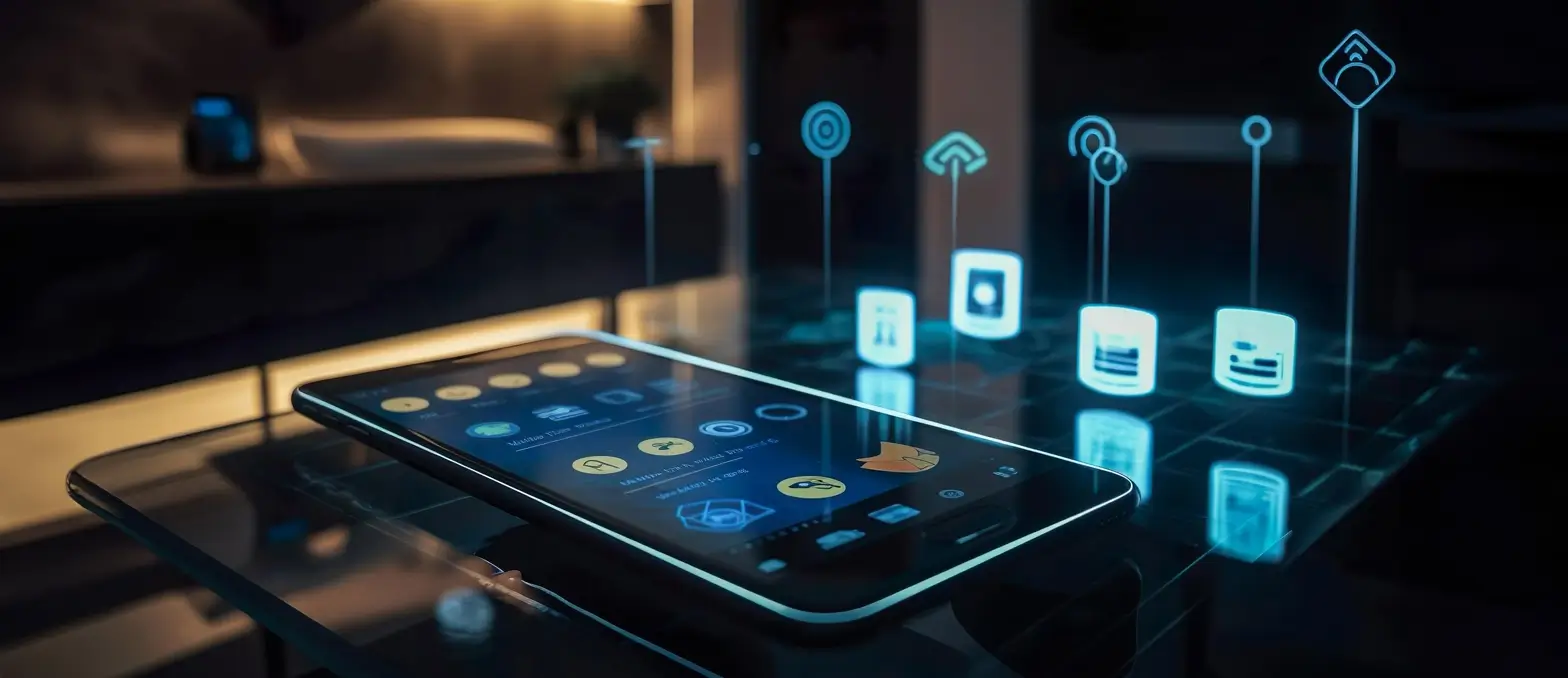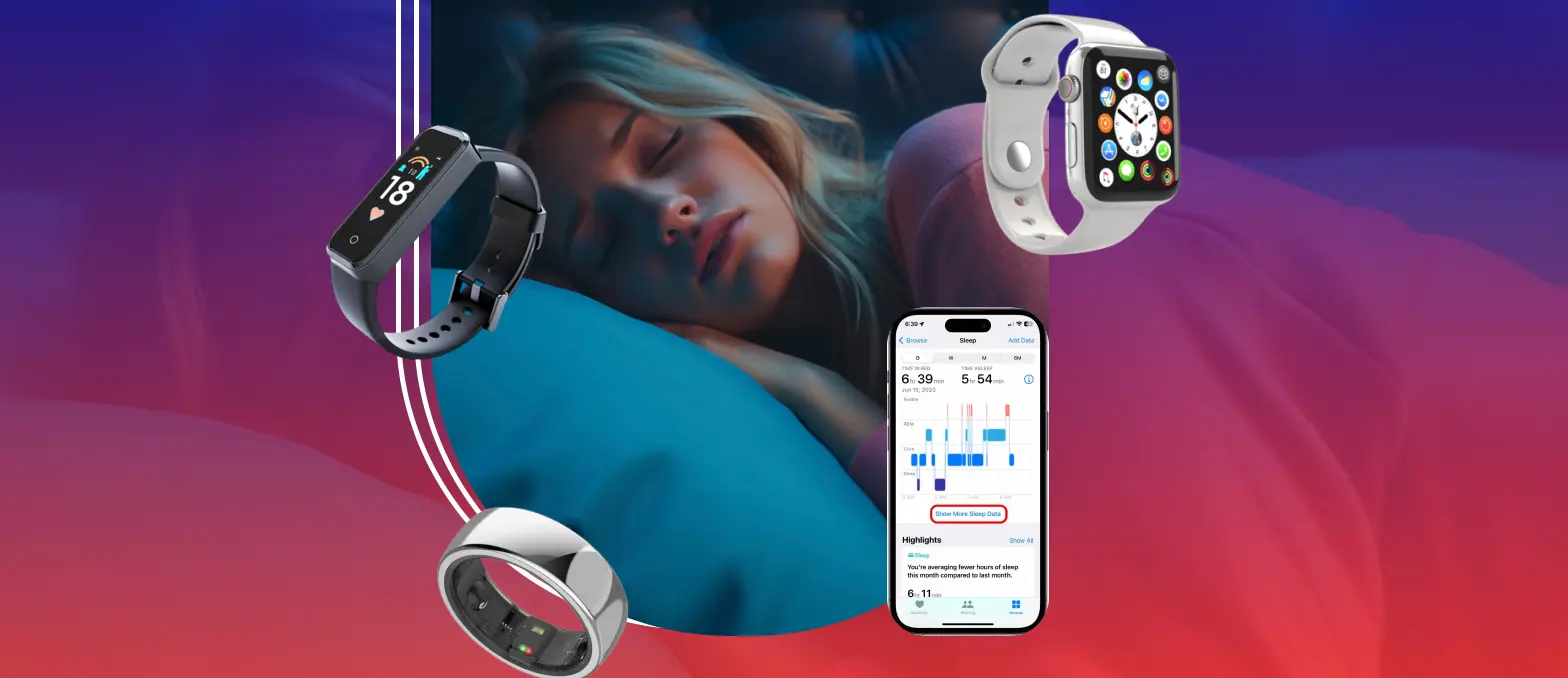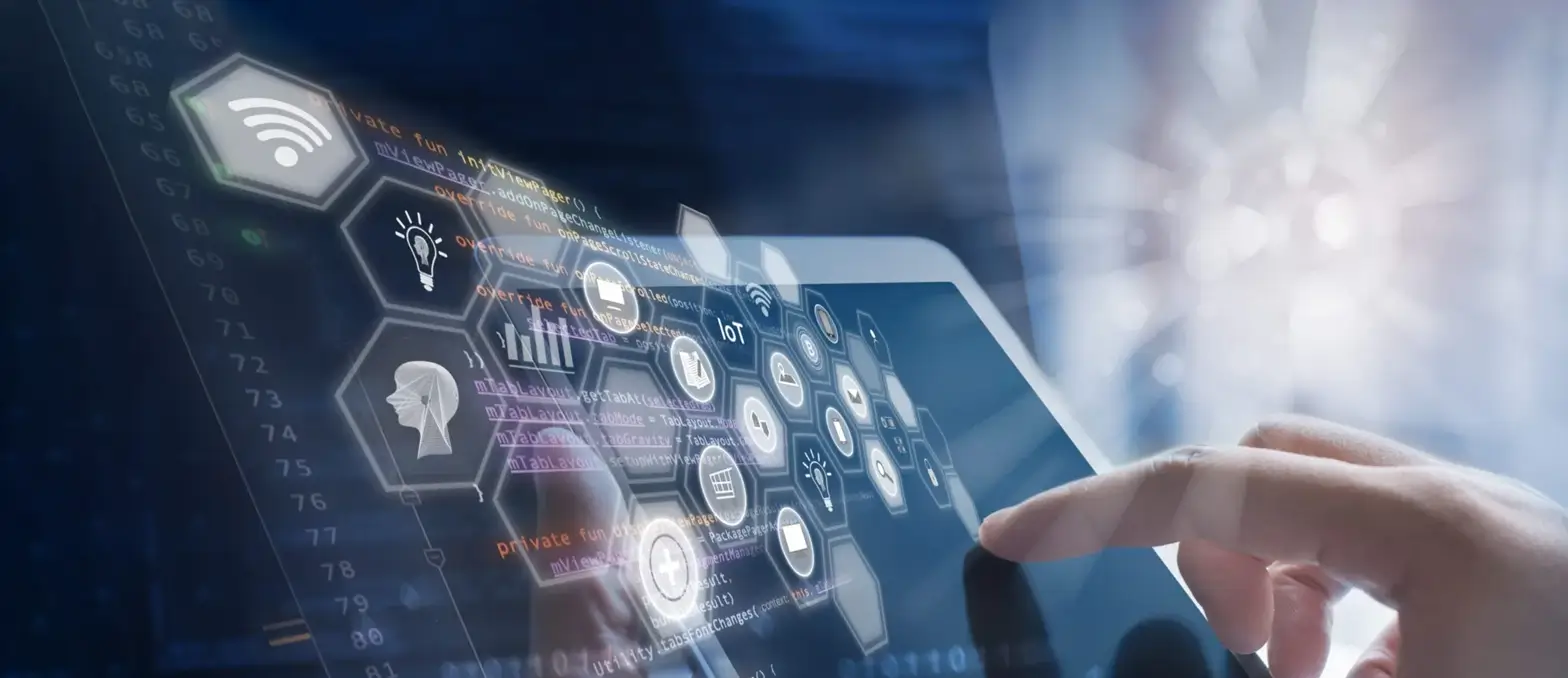Table of Contents
“The biggest part of our digital transformation is changing the way we think!”- Simeon Preston, Bupa
Applications for managing health have grown in significance as a tool for helping people maintain their well-being. Users can be empowered to lead healthier lifestyles and take better care of their medical ailments with the help of a decent health app that has practical features. Also, the characteristics that are essential for any successful health application will be covered in this article.
90% of the countries in the WHO European region reported having at least one mHealth program that was sponsored by the government. The utilization of mobile devices in health and medical practices is referred to as mHealth
These capabilities include the capacity to keep track of health information, establish reminders, enable personalization based on user preferences, provide information and resources, and facilitate interactions with the community. Also, health apps may greatly enhance a person’s journey toward better health outcomes when they are appropriately created and used.
What is a Health Application?
By 2023, more than 30 percent of the adults living in the United States checked an app which helped them monitor or monitor their health many times per day. Another quarter of respondents stated that they used health apps on a daily basis.
A health app is like a personal health assistant you carry in your pocket. While actual physicians remain the expert guides for your health journey, health apps aim to be useful companions that make staying on track a bit easier.
Best health applications allow you to log numbers that matter – blood pressure, weight, blood sugar, sleep hours, steps walked – giving you data to see patterns and spot changes. They set reminders to help you form good habits around tasks that support your wellbeing.
The custom app development services expert states that health apps provide a library of trustworthy information and advice so you can make choices aligned with your goals. And the best health apps connect you to a community of like-minded people, providing encouragement, accountability and ideas that propel progress.
In essence, health apps strive to be digital partners that grant you insights into your body, structure to your routine, knowledge for your choices, and community for your motivation. Also, turning an overwhelming health journey into manageable, mindful steps you take one day at a time, with a helpful app by your side.
Importance of Choosing the Right Health Application
Many health apps are available but choosing the right one is important for effectiveness. Here are reasons why you must consider going for health application development service now:
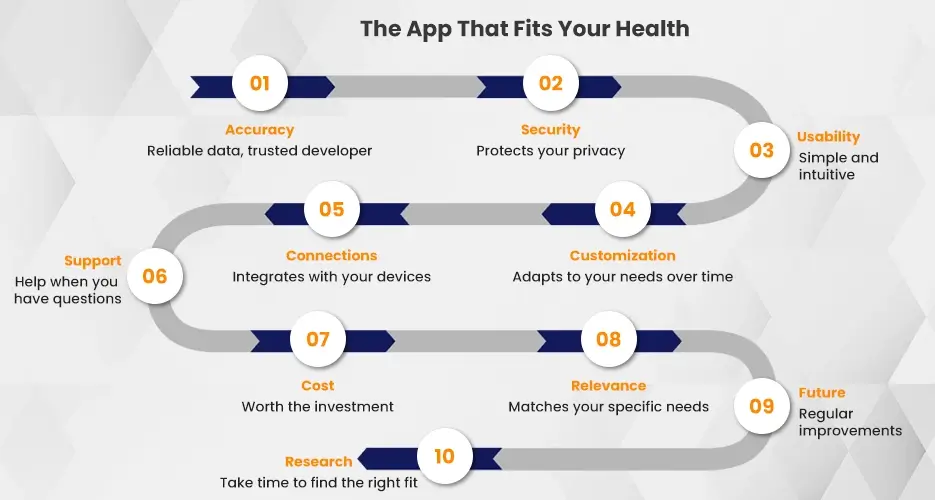
- Accuracy – Some health apps have inaccurate information or faulty measurements. Check app reviews and developer reputation to find reliable data and advice.
- Security – Ensure the app properly protects your personal health information. Check the app’s privacy policy.
- Usability – A poorly designed app with confusing features will be hard to use and eventually ignored. Look for apps with simple, intuitive interfaces.
- Connections – An app that integrates with other devices and apps you already use will provide more value.
- Customization – The best health apps will adjust to your specific needs and goals over time.
- Support – Does the app offer support if you have questions or issues? Check app store ratings for responsiveness.
- Cost – Free apps can be good but may have ads or limited features. Paid apps ensure developers have proper incentives.
- Relevance – Make sure the app’s focus and features match your specific health needs and interests. General health apps may lack specialized features.
- Future updates – Will the app regularly release new upgrades and improvements over time?
In summary, carefully researching available health apps and considering factors like accuracy, usability, cost, relevance, and ongoing support can help you choose an effective tool to improve your health and wellbeing. Taking the time to find the right app will maximize benefits and results.
Features of Health Application
The custom health application development experts state that below are the top features that you must have in your application. Read out now:
User-Friendly Interface
A user-friendly interface is an important feature of any health application. A well-designed interface makes an app easy to use, navigate and understand. This encourages greater engagement from users and better adherence to the health program.
So, some ways health apps create user-friendly interfaces:
- Simple navigation – Use straightforward tabs, menus, and buttons for key functions. Avoid overly-complicated structures.
- Intuitive icons and terminology – Adopt icons and labels that are self-explanatory and match how users think about features by healthcare app developers.
- Consistent layout – Maintain similar positioning of buttons, menus, and inputs across screens to create familiarity.
- Adaptive design – Healthcare app developers should optimize the interface for different screen sizes to accommodate both smartphones and tablets.
- Minimize inputs – Limit the number of required text inputs and questions to keep it simple.
- Actionable feedback – Also, convey status updates, results, and achievements to motivate users.
Personalized Health Profiles
Many health applications incorporate personalized health profiles to tailor the experience to each user. Personalized profiles allow apps to provide more relevant and effective guidance and recommendations. To create a personalized health profile, heath application development companies typically ask users to input information like:
- Demographics – age, gender, weight, height
- Health history – medical conditions, medications, allergies
- Fitness level – current exercise routine and goals
- Diet – food preferences, restrictions, and diet type
- Sleep – typical sleep patterns and any issues
- Goals – specific health aims like weight loss, stress reduction, etc.
After creating a profile, health apps can personalize features like:
- Calorie recommendations based on age, gender, and fitness goals
- Exercise routines customized for fitness levels and health conditions
- Reminders tailored around medication schedules
- Progress tracking specific to a user’s health aims
- Goals set at appropriate levels for each individual
Health Monitoring and Tracking
Many health applications offer users the ability to monitor and track important health metrics over some time. This data collection by healthcare app developers enables users to identify patterns, measure progress, and make more informed health decisions.
Also, health apps can track things like how many steps users take in a day, the distance they cover, how many active minutes they have, and calories burned through exercise. They can also track calories and macros consumed through food as well as nutrition factors like water intake. Some heath application development process monitors vitals including blood pressure, blood glucose levels, weight, heart rate, and oxygen saturation. Sleep metrics like time spent asleep, sleep stages, and sleep quality are also common data points that health apps track. Mood indicators such as stress levels and emotional well-being can be recorded.
Health apps use different methods to gather this data, from manual inputs by the user to sync with connected devices like activity trackers, smartwatches, and medical sensors that feed data directly into the app. Also, after collecting information, healthcare app developers can also analyze trends over time which offers insights into things like exercise patterns, correlations between eating habits and sleep, triggers for stress changes, and vital sign fluctuations. This also allows users to gain a better understanding of how their behaviors impact health to make effective changes.
Exercise and Activity Tracking Feature in Health Application
The healthcare app development company assures that Many health apps offer exercise and activity-tracking features to help users monitor and improve their fitness routines. These apps can track metrics like steps walked, distance covered, calories burned, and active minutes. They also use this data to provide insights into a user’s exercise habits and recommend ways to improve.
To track activity levels, health app development may sync with wearable fitness trackers and smartwatches that detect motion and heartbeat. Some apps allow manual input of workouts for more precise tracking. Over time, the heath application development also analyze the collected data to identify trends like:
- Days and times users are most or least active
- Correlations between activity and sleep patterns
- Types of workouts that burn the most calories
- Ways to gradually increase exercise frequency and intensity
Based on the analyzed data and a user’s fitness goals, health apps offer tailored recommendations like:
- Custom workout routines
- Suggested durations and intensities for different activities
- Challenges to motivate users to be more active
- Progress reports with achievable next steps
Nutrition and Diet Management in Health Application
Many mHealth app development services will provide tools to help users manage their nutrition, diets, and eating habits to achieve health and wellness goals. Some of the functions these apps offer include tracking calories and macros consumed, creating customized meal plans, generating personalized grocery lists, logging consumed foods from a large database, and monitoring measurements over time. The apps developed through health application development can also analyze the nutritional profile of logged foods including vitamins, minerals, and other micronutrients.
Also, based on the collected data about users’ diets and body measurements, health apps provide recommendations. For example, suggested meal and snack ideas that fit calorie or macro limits, healthier food swaps to reduce calories, fat, or carbs, adjustments to micronutrient intake from diet, and alterations to help reach weight loss or gain targets.
The goal of nutrition and diet management features in health applications is to help users make positive changes to their eating habits. Tools like calorie counting, meal planning, food logging, and progress tracking work alongside personalized nutrition recommendations and feedback. Healthcare app developers provide guidance and motivation for achieving health goals related to weight management and well-being.
Sleep Tracking Feature in a Health Application
Many health apps offer sleep-tracking functions to monitor and improve the quality and amount of sleep. These applications gather data about users’ sleep patterns to provide insights and suggestions.
So, health apps collect sleep information in different ways. Some sync with devices like fitness trackers and smartwatches that detect movement and heart rate during sleep. Other healthcare apps Like Zocdoc also require manual data entry where users report how long they slept and their sleep quality each night.
After accumulating user data, the health applications analyze sleep patterns to identify things like:
- Nights with the most disruptions
- Correlations between sleep quality and activity levels during the day
- Trends in total hours of sleep per week
Based on the collected data and a user’s sleep goals, the health apps provide customized recommendations to enhance sleep. These may include:
- Establishing routines before bed
- Reducing light and noise at night
- Adjusting workouts to earlier times
- Using meditation and breathing exercises for relaxation.
Medication and Health Reminders
According to a healthcare app development services expert, many health applications provide medication and health reminders to help users manage their treatment plans and maintain healthy habits. These reminder features can improve medication adherence and promote better health outcomes.
Also, users input their scheduled doses for each medication into the health app. The health app then sends push notifications, in-app notifications, or alarm reminders at the appropriate times. Some healthcare apps allow users to customize the reminder frequency to accommodate dosing schedules.
In addition to medication reminders, health apps also provide reminders for healthy habits like:
- Drinking enough water
- Exercising
- Eating regular meals
- Scheduling doctor appointments
The reminders use various methods like notifications, alarms, and messages to prompt users at specific times. Some health apps also allow users to customize the wording, sounds, and repetition of the reminders.
Symptoms Checking Feature
A symptom checking feature can be a valuable addition to a health application, especially for users who want a quick and convenient way to determine if they need to seek medical attention. By answering a series of questions about symptoms and general health status, users can receive possible diagnoses and recommendations about next steps.
Also, an effective symptoms checker works by asking users to select from a list of symptoms they are experiencing and then inputting some basic information like age, gender and medical history. The app then analyzes the entered data to generate potential conditions that could be causing the symptoms along with the likelihood of each condition. The diagnosis is meant to provide guidance but should always be taken as preliminary. No symptoms checker can ever replace an actual medical exam and doctor’s evaluation.
So, to improve accuracy, health apps should have their symptoms checkers reviewed by medical professionals and updated regularly. As with all artificial intelligence-based diagnostic tools, symptoms checker still require proper studies and validation. False positives and false negatives are possible risks that users need to be aware of. Several disclaimers highlighting the limitations should be clearly presented.
Despite the limitations, a symptom checker within a health app can still serve as a helpful starting point for guiding users on next steps for their health. Potential diagnoses generated by the symptoms checker can prompt users to seek an actual medical consultation or point them towards related health information within the app. But it’s important for health apps to be transparent about the capabilities and risks of these features of hybrid mHealth apps to properly manage user expectations.
Social and Community Features
Some examples of social features found in health application include:
- Challenges or group activities where users work together in teams to achieve health goals. This creates a sense of competition and camaraderie that drives results.
- Messaging features that allow users to send private messages of support, accountability checks, and progress updates to connections within the health app.
- Profiles that display a summary of a user’s health details, goals, and progress for their connections to see.
So, social and community features give health applications elements of online support groups and social networks that can supplement the data tracking, feedback, and recommendations provided by the primary functions of the health app. Also, when users feel connected and supported, they are more likely to adhere to health programs and achieve their goals.
Data Security and Privacy
According to healthcare app development companies, data security and privacy features are essential for health applications that collect and store sensitive user information. Also, without proper security measures, users risk exposing personal details that could be misused.
Some security and privacy features that is included in telemedicine app development are:
- Encryption of user data both at rest in storage and transit during network transfer.
- Secure login methods like two-factor authentication and complex password requirements to restrict access to user accounts.
- Restricting the minimum amount of permissions and data access required for the health app to function properly.
- Regular security updates to patch any vulnerabilities that arise over time.
- Transparency around what data is collected, how it is used, and with whom it may be shared.
- Direct control of users to delete their data from the health app at any time.
- Adhering to privacy regulations and security standards for health data, like HIPAA in the U.S.
Also, data security and privacy features aim to keep user data safe from unauthorized access and potential misuse. Cloud-based healthcare solutions also help maintain the trust required for health applications that track and store sensitive personal data.
Integration with Healthcare Providers
When used together, health apps and healthcare teams can also create more comprehensive health management programs. Some ways healthcare apps integrate with providers include:
- Allowing bi-directional data sharing where providers can send information and instructions to patients through the health app, and patients can share collected health data with their care team.
- Giving providers access to view monitoring data, tracking results, and progress updates to inform care decisions and recommendations.
- Providing secure messaging that allows direct communication between providers and patients through the health app to discuss health concerns, management plans, and program adjustments.
- Notifications sent from the app alert providers when patients miss scheduled appointments, neglect to fill prescriptions or show concerning changes in tracked health metrics.
Integration between health applications and healthcare providers aims to create a connected care experience where information continuously flows between the digital tools patients use and the professionals managing their health. Also, when used together effectively, apps and medical care can also function as complementary parts of a unified health management system customized for each individual.
Goal Setting and Progress Tracking Feature
Many health applications incorporate goal-setting and progress-tracking features to help motivate users and measure the effectiveness of the health apps. Setting specific and measurable health goals gives users direction and a target to work towards.
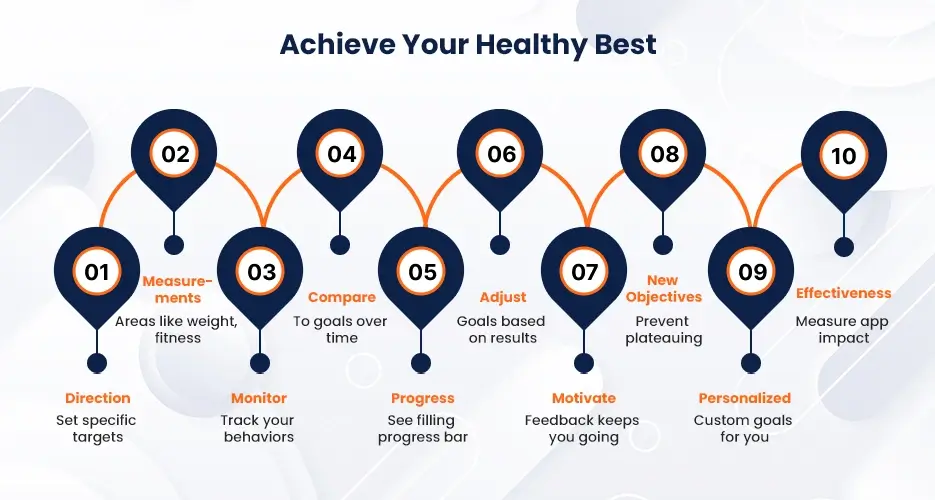
As per custom mobile application development company, health applications allow users to input customized goals in areas like weight loss, fitness level, nutrition habits, medication adherence, sleep quality, and stress management. After setting goals, the apps monitor users’ progress through the data collected from tracking functions.
Also, progress tracking also shows users how their behaviors and results compare to their stated goals. Some healthcare apps feature a progress bar that visually fills as users move closer to achieving their aims. Over time, the apps may recommend adjusting goals based on a user’s tracked progress.
Along with monitoring progress, health apps provide feedback and encouragement to keep users motivated. As goals are approached, the health apps may also suggest new objectives to prevent plateauing.
Analytics and Insights Feature
Being able to easily access health analytics and actionable insights is an important feature for many health applications. Raw data alone has limited value; it is the meaningful conclusions and takeaways derived from that data which can truly empower users to make positive changes. Also, analytics and insights features transform data into useful information that helps people achieve their health goals.
A healthcare app that provides analytics and insights should clearly visualize trends in the data over time. Graphs, charts, and timelines help users spot patterns in metrics like weight, blood pressure, steps walked, and more. Also, simple representations of diet, sleep, and exercise routines can highlight imbalances that may be impacting health. More advanced analytics may uncover correlations between different data points to generate targeted recommendations. For example, an app may analyze a user’s meal logging and exercise activity to make suggestions for improving nutrition.
So, the insights generated by health apps should be personalized and specific in order to be most effective. Generic tips and advice that do not account for an individual’s data, circumstances and priorities are of little value. The best health analytics features analyze a user’s complete profile and history within the app to surface the most relevant and beneficial insights. Also, with the right analytics and insights based on their own comprehensive health data, users gain a deeper understanding of their behaviors and what they need to prioritize in order to improve.
Conclusion
The most valuable health applications aim to help users effectively track and manage their health data, adhere to routines, and stay motivated through visualizations, reminders, goals, and social connections. However, to truly provide benefit, health apps must be designed with simplicity, usability, and relevance to an individual’s specific needs in mind. While technology can assist a healthy lifestyle, it does not replace medical advice and care. Overall, when selected and used properly, health apps have great potential to complement and enhance an individual’s journey toward better health and wellbeing. If you are looking to hire healthcare app developers, then you can always trust the experts at A3Logics and get all the support.
FAQs
What is the objective of a health application?
The main objective of health apps is to help users improve and manage their health and wellbeing. So, health apps aim to make it easier for people to track important health data, maintain healthy routines, access relevant health information, connect with others, and accomplish health goals.
By allowing users to conveniently log things like blood pressure, weight, symptoms and exercise, health apps provide valuable data that can reveal changes, trends and areas needing focus. Also, they set reminders to form better habits around tasks like taking medication and working out.
The top mobile app development companies in USA claims that health apps also provide advice, articles and resources to educate users and encourage healthy choices. Some apps connect users to devices to automatically import health data for a more complete picture. Also, the social features of many apps give users a support network that can help motivate behavior change and goal achievement.
What are the top 5 benefits of having mobile apps in healthcare?
Mobile health apps can provide many benefits for both patients and healthcare providers. Here are the top 5:
- Improve access to care – Apps allow patients to easily communicate with doctors and seek advice anytime, reducing the need for in-person visits.
- Monitor health from anywhere – Apps make it simple for patients to track health data and symptoms anywhere, giving doctors a more complete picture.
- Provide health information – Apps provide on-demand access to health resources, articles and tips to help patients make better choices.
- Remind patients – Apps can easily remind patients to take medications, make appointments and perform self-care tasks to improve health management.
- Connect patients and providers – Apps facilitate secure messaging and data sharing between patients and care teams to streamline care coordination.
What is important for the functionality of a health application?
As per the top healthcare digital transformation companies, there are several important factors for healthcare apps to function properly and provide value.
- Tracking – It’s crucial that patients have the capacity to quickly track important health information. Vital signs, symptoms, treatments, and activities are all part of this.
- Connecting with clinicians and care teams through secure messaging and appointment scheduling tools.
- Personalization – Over time, the app should adjust to the particular requirements and ailments of different patients.
- Integration – Enhancing data exchange and workflow through integration with various apps and devices used by patients and providers.
- Usability – Even for older patients or those with less technological knowledge, the interface should be clear and straightforward to use.
Are health applications free?
Many health applications, especially the simpler ones, are free to download. However, not all health apps are free, especially generative AI in Healthcare domain. Some are only available for a fee. So, many free health apps make money through advertisements that appear within the app. While this allows the app to be provided at no cost to users, the ads can be intrusive.
Paid health apps tend to offer more features and functionality. Also, Users pay either a one-time purchase fee or a monthly/yearly subscription. Benefits of paid apps include fewer or no advertisements and more comprehensive health tracking, monitoring and coaching tools. However, some of the best free health apps provide just as much value as paid apps. Also, developers of free apps are increasingly minimizing ads and adding robust functionality to compete.


